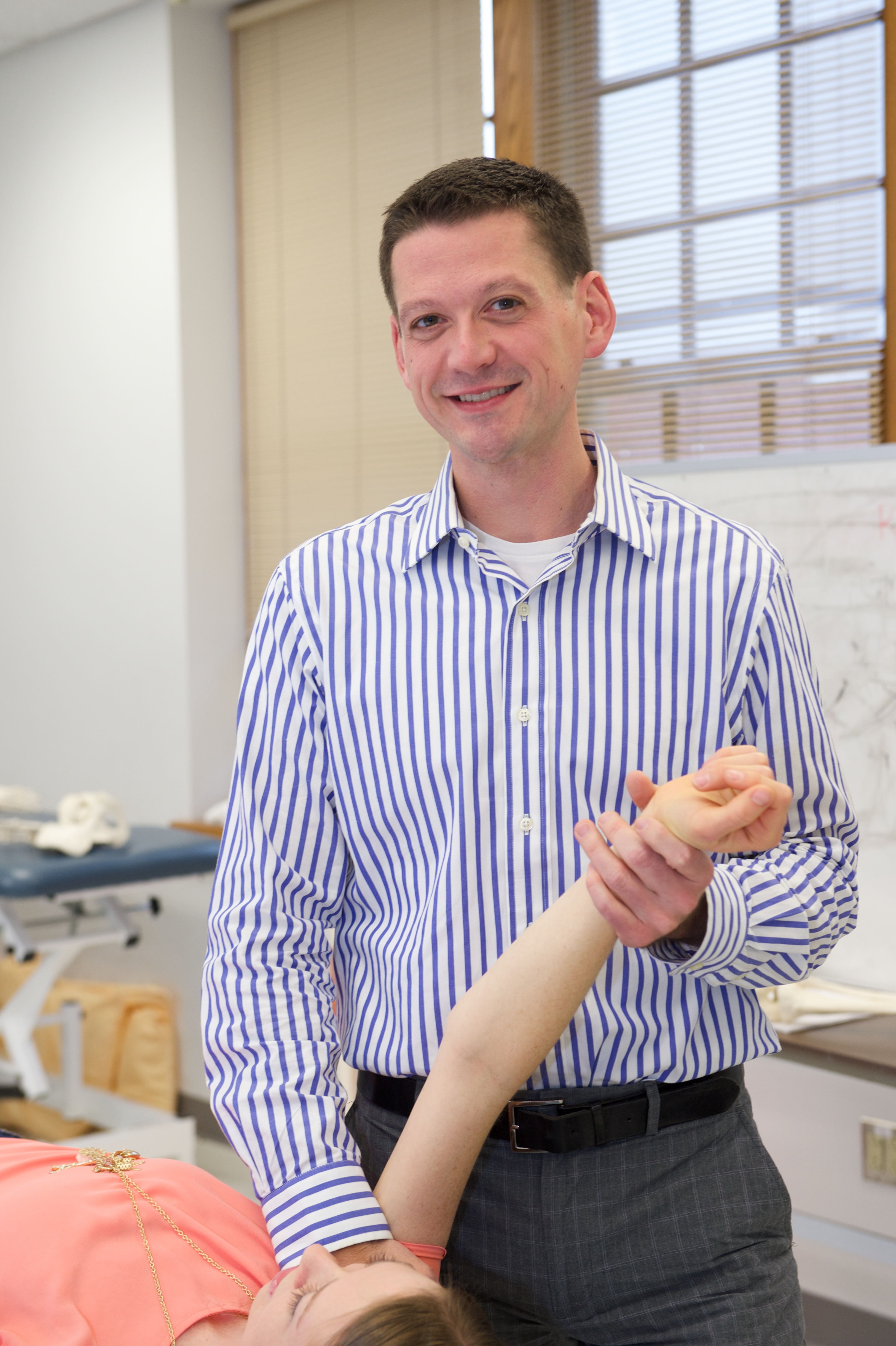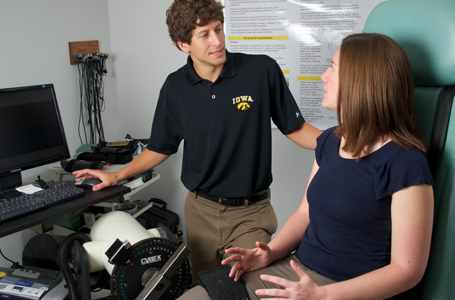
Meet PhD Student Keith Cole
Where is your hometown?
I was born and raised in Iowa City, Iowa.
What is your educational background?
I earned a BSE in Biomedical Engineering at the University of Iowa, a Masters in Biomedical Engineering at the University of New South Wales in Sydney Australia (research component at the University of Sydney Rehabilitation Research Centre), and a Doctor of Physical Therapy at the University of Iowa.
What interested you to pursue a PhD in rehabilitation science?
Starting my academic career as an engineer, I have been keenly interested in how things work, and how to make them work better. This has been a perfect match for my role as an outpatient physical therapist, as we're continually trying to determine functional limitations and how to improve the performance of individuals with some aspect of physical limitation. Throughout eight years of practice in the Chicagoland area, I have been an avid consumer of research articles, attempting to be able to do this at the highest level possible. This was a skill (and responsibility) instilled in me by the faculty at The University of Iowa. As I continued to practice, I realized that there are many more questions yet to be addressed to help people function at their highest. I recently realized that returning to my research roots was the best way for me to contribute to the knowledge base to help other physical therapists meet the same goals of minimizing limitations in the most efficient way possible.
Is there a teacher or mentor who helped you decide on this career path?
I have been lucky to have many supportive teachers and mentors throughout my career. The mentor that contributed the most to my career path has been Dr. Richard Shields. I started working for him as an undergraduate engineering student. At the time I had the aspiration of going to medical school. Though he supported this goal and never deterred me from it, he helped me to see that application of engineering and research techniques in a way to help people and improve their lives through physical therapy and rehabilitation science. Dr. Shields has, and continues now, to help me to see the big picture in research, the profession, and how it impacts peoples' lives. He has helped to make me the best engineer, clinician, and now researcher that I can be.
How or why did you choose the University of Iowa for your education?
I actually looked at many other programs before deciding on The University of Iowa Department of Physical Therapy and Rehabilitation Science. Even through I can recognize a bias of growing up in Iowa City, and already having two degrees from the University of Iowa, I realized that finding the right program over the most convenient was important to facilitate the best future. Key criteria that lead me to the University of Iowa were:
Flexibility: Many programs do not allow you to choose your research advisor before commencing, and some even require rotating through laboratories (generally three) before choosing your advisor. The University of Iowa, however, facilitated speaking with my mentor before enrolling. We even were able to carve out a research direction that interested me to ensure the best outcome from the program.
Efficiency of Completion: Several of the other universities that I looked at made it difficult to apply credits from other universities or degrees toward the PhD. The U of I clearly and logically applies credits toward the PhD from the DPT and Masters course work to ensure graduation in a timely manner while still gaining the necessary didactic and research experience to become a successful investigator.
Funding: The University of Iowa has a long history of NIH funding, allowing the facilities and means to support faculty and students through the entire degree. This was important to me to not incur further debt beyond that of the 9 previous years of education that I had.
Program Excellence: The department at the U of I has been highly ranked for decades, and is currently ranked by US News & World Report as #2 among public institutions (#5 overall). This is also reflected in that every faculty member (in my opinion) is engaged in impacting, interesting research.
The People: Of the universities that I contacted and visited, the University of Iowa has the friendliest atmosphere. Every one of the faculty and staff are friendly and engaging. It was important for me to not only get an excellent education and research experience, but to form a network to succeed from. I felt that this department had the best opportunity to accomplish this.
What are your career objectives?
My career objectives are to gain the tools to become a successful, autonomous researcher int he area of human motor control and muscle physiology. This involves skills of 1) asking clinically and socially relevant questions, 2) utilizing tools of analysis in motor control and muscle physiology, 3) experimental design and statistics, 4) written communication for peer review, and 5) spoken communication for presentation of ideas to peers and students.
What are some of your outside interests?
In my free time I like to stay active by running, biking, and playing golf. A colleague and I have the goal of running a half marathon in every state (6 down). I have always loved all types of music, and play the piano and violin. I was in a community orchestra in Chicago while practicing as a physical therapist, and now am part of The Unexpected Perturbations, a band formed by our lab members that Dr. Shields has organized for a social (and comical) outlet. I love to travel, experiencing other cultures. I've been fortunate enough to travel to a total of 18 different countries, and having lived in Australia for 2 years.
What one piece of advice would you give to a prospective student?
For a prospective student for any program, I would recommend visiting the department that you'll be in, and sitting down with your potential advisor. You want to be sure that the program not only matches your needs on paper, but that you are comfortable interacting with your advisor, and comfortable in the learning environment of the department, university, and city. Graduate studies are a long, at times stressful, road. You want to be sure that you have the right network established for you to get through it efficiently, and sanely.
Why would you recommend students to apply to the PhD program in Rehabilitation Science at the University of Iowa?
I would recommend students to apply to the PhD program in the Department of Physical Therapy and Rehabilitation Science because of the excellent faculty, the novel and impacting research, the great facilities, and the long track record of producing top-notch researchers in the area of physical therapy.

Meet PhD Student Dan Cobian
What is your hometown?
River Falls, WI
What is your educational background?
I hold a bachelor’s degree in Biology and Kinesiology and a doctoral degree in Physical Therapy, both from the University of Wisconsin-Madison.
What interested you to pursue a PhD in rehabilitation science?
To me, there is nothing more intriguing and directly applicable than the study of the human body. The better we understand the way the human body functions, particularly in the context of injury and disease, the better we can help people to live full and healthy lives. I’ve been interested in a career in health care since high school, but only in the last few years did I realize that the best way I fit into the health care puzzle is as a research scientist. Each individual working to improve our understanding and treatment of health care issues can only do so much. The key is that we put in the time and effort to do quality work so we create a layer of knowledge that others that can build on. Over time, we are collectively able to make conclusive statements backed by our rigorous investigations and can move on to answering the next line of questions.
Is there a teacher or mentor who helped you decide on this career path?
During my undergraduate studies at UW-Madison, I began working on a research project under the guidance of Dr. Bryan Heiderscheit, a professor in the physical therapy department. Dr. Heiderscheit was an excellent mentor. He gave me a chance to prove myself and I began to really enjoy the process of scientific research. I continued to work with him throughout my DPT education and decided that a career in research was the right fit for me.
How or why did you choose the University of Iowa for your education?
The Department of Physical Therapy and Rehabilitation Science at the University of Iowa has an excellent reputation for performing high quality scientific research and producing outstanding PhD graduates. My mentor is Dr. Glenn Williams, a developing leader in the field of musculoskeletal research. He is well known for performing forward-thinking research conducted with rigorous methodology. The chance to be part of a growing lab and have new and exciting research opportunities with a focus in orthopaedics and sports medicine is what drew me to Iowa.
What are your career objectives?
As a post-professional student, my focus is to develop my skills as a creditable scientist whose work contributes to improving our understanding of human health and our performance of skilled physical therapy. Ultimately, I hope to establish myself as a tenure track faculty member of a physical therapy program where I can develop an independent line of research that makes an impact on our field while contributing to the education of future physical therapists.
What are some of your outside interests?
Like many in the health sciences, I enjoy nearly all sports and athletic activities, with basketball, racquetball, and sand volleyball at the top of the list. I also try to get outdoors as much as I can, hiking and fishing in the spring and fall and waterskiing in the summer. It can be a challenge to keep me sedentary, but games like euchre and Maria hold my attention from time to time.
What one piece of advice would you give to a prospective student?
Be able to give a clear and logical answer to the question “Why do you want a PhD degree?” Have an idea of what you want your career and life to look like and determine if the PhD degree is the right fit for you. Once you are certain of that choice, find something that you are passionate about and dive in. At this level, you really are entirely responsible for your success or failure, so you need to study something that will keep you self-motivated to continue to read, experiment, and learn throughout your education and career.
Why would you recommend students to apply to the PhD program in Rehabilitation Science at the University of Iowa?
The diversity of the faculty and the resources available within the University of Iowa Carver College of Medicine are second to none. The department has an outstanding history of success in producing graduate-level faculty candidates. Iowa City has a small town feel and is equal parts great college town and great place to raise a family.